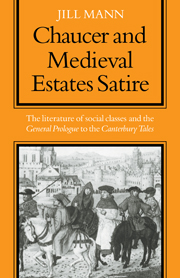Book contents
- Frontmatter
- Contents
- Preface
- List of Abbreviations
- Note on References
- 1 Introduction
- 2 The Anti-Clerical Tradition in Estates Satire
- 3 Estates Ideals
- 4 The Omission of the Victim
- 5 Independent Traditions: Chivalry and Anti-Feminism
- 6 Descriptive Traditions: Beauty and the Beast
- 7 ‘Scientific’ Portraits
- 8 New Creations
- Excursus: The ‘General Prologue’ and the ‘Descriptio’ Tradition
- 9 Conclusions
- Appendices
- Notes
- Selected Bibliography and List of Works Cited
- Index
- Frontmatter
- Contents
- Preface
- List of Abbreviations
- Note on References
- 1 Introduction
- 2 The Anti-Clerical Tradition in Estates Satire
- 3 Estates Ideals
- 4 The Omission of the Victim
- 5 Independent Traditions: Chivalry and Anti-Feminism
- 6 Descriptive Traditions: Beauty and the Beast
- 7 ‘Scientific’ Portraits
- 8 New Creations
- Excursus: The ‘General Prologue’ and the ‘Descriptio’ Tradition
- 9 Conclusions
- Appendices
- Notes
- Selected Bibliography and List of Works Cited
- Index
Summary
This book is an attempt to discover the origins and significance of the General Prologue to the Canterbury Tales. The interest of such an inquiry, as I hope will become clear, is many-sided. On the one hand, it throws light on the question of whether ‘life’ or ‘literature’ was Chaucer's model in this work, on the relationship between Chaucer's twenty-odd pilgrims and the structure of medieval society, and on the role of their ‘estate’ in determining the elements of which Chaucer composes their portraits. On the other hand, it makes suggestions about the ways in which Chaucer convinces us of the individuality of his pilgrims, about the nature of his irony, and the kind of moral standards implicit in the Prologue. This leads me to suggest that Chaucer is ironically substituting for the traditional moral view of social structure a vision of a world where morality becomes as specialised to the individual as his work-life.
Although my work is not a source-study in the straightforward sense of the term, my procedure is to examine medieval satire on the ‘estates’ or classes of society written in Latin, French and English within the period 1100–1400. The earlier date means that I can give full prominence to the rich abundance of twelfth-century Latin satire; the latter date is set by the date of the Prologue itself, which is usually taken to be 1387.
- Type
- Chapter
- Information
- Chaucer and Medieval Estates Satire , pp. xi - xiiPublisher: Cambridge University PressPrint publication year: 1973



